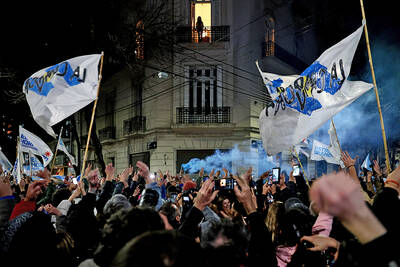Colombia’s leftist guerrillas are increasingly relying on drones to drop explosives on rivals, sowing terror in rural areas and leaving the military scrambling.
As dissident groups of the now-disbanded Revolutionary Armed Forces of Colombia (FARC) guerrilla army continue fighting over territory and trafficking routes, the low-frequency hum of a drone has become a signal for villagers to take cover.
The Colombian military has recently distributed videos of the rebels using uncrewed aircraft to attack soldiers and civilians alike — with at least 17 attacks registered in the last six weeks in conflict-torn departments such as Cauca.
Unlike the sophisticated payloads mounted on drones by soldiers in Ukraine, the guerrillas mainly use homemade explosives or fireworks.
So far their rudimentary flying bombs have claimed no lives.
However, in Popayan, the mayor’s office has banned drone flights after a June 7 attack with explosives on a police station.
Less than a week ago, a girl was injured by an explosive device dropped near a hospital in the town of Suarez, while three soldiers were recently injured in two drone attacks in the town of Argelia.
The armed forces of the South American country — battling to extract itself from a six-decade civil war — on Tuesday announced they were themselves acquiring drones aimed at “containing these terrorist actions.”
In its military campaign to seize power, the FARC spent millions of dollars on black market weaponry — machine guns, grenades and mines.
Today, the Central General Staff (EMC) and Segunda Marquetalia — two splinter groups that refused to disarm when the FARC signed a peace deal in 2016 — are increasingly relying on commercially available drones that cost less than US$1,000 apiece.
“It may be rudimentary technology, but it’s effective,” security expert Luis Armas said.
Agence France-Presse (AFP) obtained transcripts from an official source of intercepted phone calls between EMC members discussing plans for drone strikes. In one, the rebels mull “neighborhoods where the oligarchy lives” in Bogota.
Police in the Colombian capital this week announced they had acquired a “Dronebuster 3” to jam drone communications.
A guerrilla commander told AFP that obtaining drones was a priority for the insurgents.
“If the enemy is preparing itself ... with drones, then of course we have to keep up,” he said in a voice message from the country’s southwest.
Cauca Security Secretary Miller Hurtado told Colombian outlet W Radio there was a race among armed groups to show “that they are better armed, that they have better technology.”
However, with the drones lacking precision targeting methods, explosives risk landing on unintended civilian locations such as schools.
Conflict Analysis Resource Center researcher Jorge Restrepo said a massive uptake in drone use “would mean a huge jump in military capacity” for guerrilla fighters.
“The armed forces are not prepared” for this new “terrorism” tool, he said.
Colombian Minister of National Defense Ivan Velasquez has acknowledged that the military’s drone-fighting capabilities are “insufficient.”

LANDMARK CASE: ‘Every night we were dragged to US soldiers and sexually abused. Every week we were forced to undergo venereal disease tests,’ a victim said More than 100 South Korean women who were forced to work as prostitutes for US soldiers stationed in the country have filed a landmark lawsuit accusing Washington of abuse, their lawyers said yesterday. Historians and activists say tens of thousands of South Korean women worked for state-sanctioned brothels from the 1950s to 1980s, serving US troops stationed in country to protect the South from North Korea. In 2022, South Korea’s top court ruled that the government had illegally “established, managed and operated” such brothels for the US military, ordering it to pay about 120 plaintiffs compensation. Last week, 117 victims

China on Monday announced its first ever sanctions against an individual Japanese lawmaker, targeting China-born Hei Seki for “spreading fallacies” on issues such as Taiwan, Hong Kong and disputed islands, prompting a protest from Tokyo. Beijing has an ongoing spat with Tokyo over islands in the East China Sea claimed by both countries, and considers foreign criticism on sensitive political topics to be acts of interference. Seki, a naturalised Japanese citizen, “spread false information, colluded with Japanese anti-China forces, and wantonly attacked and smeared China”, foreign ministry spokesman Lin Jian told reporters on Monday. “For his own selfish interests, (Seki)

Argentine President Javier Milei on Sunday vowed to “accelerate” his libertarian reforms after a crushing defeat in Buenos Aires provincial elections. The 54-year-old economist has slashed public spending, dismissed tens of thousands of public employees and led a major deregulation drive since taking office in December 2023. He acknowledged his party’s “clear defeat” by the center-left Peronist movement in the elections to the legislature of Buenos Aires province, the country’s economic powerhouse. A deflated-sounding Milei admitted to unspecified “mistakes” which he vowed to “correct,” but said he would not be swayed “one millimeter” from his reform agenda. “We will deepen and accelerate it,” he

Japan yesterday heralded the coming-of-age of Japanese Prince Hisahito with an elaborate ceremony at the Imperial Palace, where a succession crisis is brewing. The nephew of Japanese Emperor Naruhito, Hisahito received a black silk-and-lacquer crown at the ceremony, which marks the beginning of his royal adult life. “Thank you very much for bestowing the crown today at the coming-of-age ceremony,” Hisahito said. “I will fulfill my duties, being aware of my responsibilities as an adult member of the imperial family.” Although the emperor has a daughter — Princess Aiko — the 23-year-old has been sidelined by the royal family’s male-only